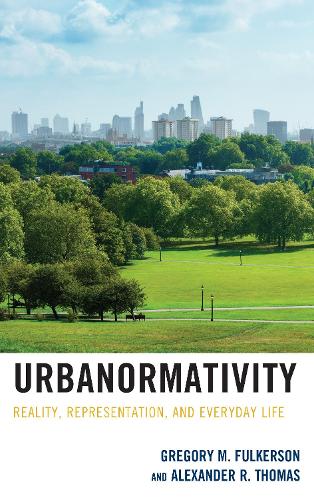
Urbanormativity: Reality, Representation, and Everyday Life
(Hardback)
Available Formats
Publishing Details
Urbanormativity: Reality, Representation, and Everyday Life
By (Author) Gregory M. Fulkerson
By (author) Alexander R. Thomas
Bloomsbury Publishing PLC
Lexington Books
1st August 2019
United States
Classifications
Professional and Scholarly
Non Fiction
307
Physical Properties
Hardback
204
Width 160mm, Height 234mm, Spine 22mm
490g
Description
Urbanormativity explores a cultural ideology that posits that urban is normal and desirable while rural is deviant, exotic, or undesirable. This work examines the relevance and meaning of this phenomenon in three parts: reality, which discusses the urbanization of the planet and the inherent conflict that emerges from the condition of urban dependency; representations, which discusses the cultural dynamics of urbanormativity; and everyday life, which focuses on the outcomes of urbanormativity in terms of the legal and political landscape, emphasizing the role of spatial inequality in creating urban-rural disparities. The book then examines life in rural communities amid urbanormativity, highlighting such processes as rural gentrification as well as the transformation of the character and tradition of rural communities through the process of place structuration. This book conclude by developing a new rural justice ethic that advocates for the incorporation of Sens notion of capability maximization along with a concerted effort to revalue the ruralsocially, culturally, politically, and economically.
Reviews
Thomas and Fulkersons new book adds a deep understanding the social divide between urban and rural. This new book provides a deep discussion of the complexity of what is know as urban life and its association with progress in comparison with rural life and its mix of reality and symbolism. The authors provide a solid understanding of the social, economic, political, and attitudinal differences based upon place. It is a must read for those who want to understand the development, growth, and spread of the urban/rural divide. -- Stephanie A. Bennett-Knapp, The College of St. Rose
Thomas & Fulkerson's newest volume offers up acritical reconsideration of how we make sense of rural people and rural places, calling into question the oversimplified representations of rural dwellers, rural livelihoods, and rural culture asreflected in North American urbanormative discourses on the rural. Their exploration reveals howdependency of the urban upon the rural becomes invisible through epistemic distancing as well as through structuresboth physical and socialthat disadvantage the rural to the benefit of the urban. This includes a consideration of how rural industries, including energy, agriculture, timber and other extractive activities enrich urban populations while degrading the environment and impoverishingrural workers. They further emphasize the global dimensions of this urban-rural dependency and connect themyriad systems that work to diminish the importance of rural contributions in an increasingly urban world. This lucidly written book weaves theory and field-based evidence into avolume that will engage an academic audience, as well as policymakers andthose concerned with extending social justice efforts into rural communities. -- Aimee Vieira, Norwich University
Author Bio
Gregory M. Fulkerson is associate professor of sociology at SUNY Oneonta. Alexander R. Thomas is professor and chair of the Department of Sociology at SUNY Oneonta.
